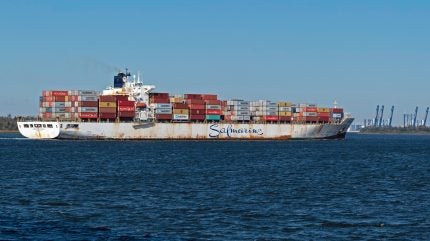
Danish container shipping giant Maersk has settled a whistleblower discrimination case in the US and agreed to delete negative records of its former employee.
The case was brought against Maersk Line by the US Department of Labor after a Chief Mate on one of the firm’s US-flagged ships was fired for reporting safety concerns directly to the Coast Guard without first informing Maersk.
As a result of the out-of-court settlement, the shipping line will compensate the unnamed sailor and change its safety reporting policies.
Solicitor for the Department, Seema Nanda, said: “No employer may violate whistleblower regulations or create policies that require employees to notify their employer before they report concerns to federal regulatory agencies.
A hearing by the US government’s Occupational Safety and Health Administration “found the company violated the employee’s rights under the federal Seaman’s Protection Act by retaliating against the seaman.”
Before the reversal, Maersk’s internal policies disallowed employees from “contacting the USCG or other federal, state or local regulatory agencies without first notifying the company.” This was found to violate US federal law.

US Tariffs are shifting - will you react or anticipate?
Don’t let policy changes catch you off guard. Stay proactive with real-time data and expert analysis.
By GlobalDataAccording to the Department of Labor, it began an investigation after an incident in 2020.
“The seaman alerted the U.S. Coast Guard about safety concerns aboard the Safmarine Mafadi, a 50,000-ton, 958-foot container ship, in December 2020. They included lifeboat equipment in need of repair and replacement, crew members onboard in possession of, and possibly consuming alcohol, improper supervision of cadet seamen, and a bilge system not preventing cargo holds from flooding,” it explained.
“This seaman showed the kind of bravery for which mariners have long been known by raising concerns that, left unchecked, could have endangered everyone aboard the Safmarine Mafadi,” Nanda added.
The shipping company has now agreed to compensate the former employee for lost wages and damages. It will also delete the termination from the worker’s record, and offer a “neutral” employment reference.
Maersk agreed to make the following changes to its internal policies:
- Remove any requirement that workers notify the company before contacting the U.S. Coast Guard.
- Refrain from retaliation against seamen who contact the USCG.
- Provide all supervisors with training on the revised policy.
- Distribute OSHA’s Seaman’s Protection Act Fact Sheet to seamen aboard its U.S. flagged vessels for the next two years.
But, under the terms of the settlement, Maersk did not admit to violations of the Seaman’s Protection Act.
“This resolution is a victory for mariners aboard U.S.-flagged vessels worldwide,” said Assistant Secretary for Occupational Safety and Health Douglas L. Parker. “Workers who cope with the ocean’s natural hazards should never fear reporting concerns about their vessel’s safety. Maritime industry workers are vital to the well-being of our nation, and there is no place for policies that restrict their rights to alert authorities to unsafe conditions.”
Maersk Line is a Norfolk, Virginia-based subsidiary of AP-Moller Maersk, operating a US-flagged fleet and employing at least 700 US workers.



